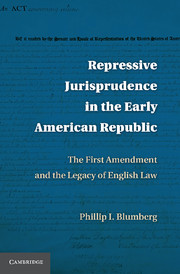 Repressive Jurisprudence in the Early American Republic
Repressive Jurisprudence in the Early American Republic Book contents
- Frontmatter
- Contents
- Acknowledgments
- 1 Political and Jurisprudential Worlds in Conflict in the New Republic
- 2 Politics in the New Republic
- 3 Criminal Libel in the Colonies, the States, and the Early Republic During the Washington Administration
- 4 Federalist Partisan Use of Criminal and Seditious Libel – Statutory and Common Law – During the Tumultuous Adams Administration
- 5 Criminal Libel During the Jefferson and Madison Administrations, 1800–1816
- 6 Partisan Prosecutions for Criminal Libel in the State Courts: Federalists Against Republicans, Republicans Against Federalists, and Republicans Against Dissident Republicans in Struggles for Party Control
- 7 Established Jurisprudential Doctrines (Other than Criminal Libel) Available in the New Republic for Suppression of Anti-Establishment Speech
- 8 Still Other 19th-Century Doctrines for Suppression of Anti-Establishment Speech: The Law of Blasphemy and the Slave State Anti-Abolition Statutes
- 9 Conclusion
- Table of Cases
- Index
6 - Partisan Prosecutions for Criminal Libel in the State Courts: Federalists Against Republicans, Republicans Against Federalists, and Republicans Against Dissident Republicans in Struggles for Party Control
Published online by Cambridge University Press: 05 October 2010
- Frontmatter
- Contents
- Acknowledgments
- 1 Political and Jurisprudential Worlds in Conflict in the New Republic
- 2 Politics in the New Republic
- 3 Criminal Libel in the Colonies, the States, and the Early Republic During the Washington Administration
- 4 Federalist Partisan Use of Criminal and Seditious Libel – Statutory and Common Law – During the Tumultuous Adams Administration
- 5 Criminal Libel During the Jefferson and Madison Administrations, 1800–1816
- 6 Partisan Prosecutions for Criminal Libel in the State Courts: Federalists Against Republicans, Republicans Against Federalists, and Republicans Against Dissident Republicans in Struggles for Party Control
- 7 Established Jurisprudential Doctrines (Other than Criminal Libel) Available in the New Republic for Suppression of Anti-Establishment Speech
- 8 Still Other 19th-Century Doctrines for Suppression of Anti-Establishment Speech: The Law of Blasphemy and the Slave State Anti-Abolition Statutes
- 9 Conclusion
- Table of Cases
- Index
Summary
Introduction
During the Jefferson and Madison administrations, the use of criminal libel prosecutions for partisan political purposes flourished in the courts in four important states. The Federalists still clung to power in Connecticut and for some time in Massachusetts, and there they used the pernicious doctrine where they could to harass Republican editors. The Republicans had attained power in New York and Pennsylvania and later in Massachusetts as well. In their turn, they seized on criminal libel prosecutions as a tool to silence Federalist editors. Still later in celebrated cases in both Pennsylvania and New York, Republican judges used repressive doctrines – criminal libel in Pennsylvania and contempt of court in New York – against opposition Republicans in the internecine warfare that emerged between the contending wings of the bitterly divided Republican parties in those states. The earlier Federalist use of criminal libel for partisan political purposes had legitimated the use of the doctrines for all. Once the political advantages that could be captured by the partisan use of criminal libel had been demonstrated, it infected the political process generally. Notwithstanding their pious, psalm-singing abhorrence of the doctrines when used by Federalists, Republicans seized on their political usefulness as they moved into power. Indeed, they went beyond the Federalists and used them against dissident factions in their own party in two of the country's most important states.
- Type
- Chapter
- Information
- Repressive Jurisprudence in the Early American RepublicThe First Amendment and the Legacy of English Law, pp. 187 - 242Publisher: Cambridge University PressPrint publication year: 2010


